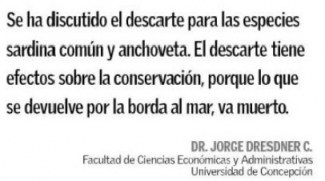FILTER
Displaying 2601 - 2610 of 3840 publications
Because the effectiveness of payment for ecosystem services (PES) programs depends on landowners’ engagement, understanding the relationship between the type of payment and participation is a key…
| EfD Discussion Paper | SwedenIn this paper, we investigate how different levels of entrance fees affect donations for a public good, a natural park. To explore this issue, the researchers conducted a stated preference study…
| EfD Discussion Paper | Central America and Mexico, SwedenJorge Dresdner wrote an opinion article about discards in Chilean fisheries. http://www.elsur.cl/impresa/2014/05/09/full/2/
| Other Publications | ChileThis paper derives Pareto-efficient provision rules for national and global public goods in a two-country world, where each individual cares about his or her relative consumption of private goods…
| Peer Reviewed |On 31 March, the Intergovernmental Panel on Climate Change (IPCC) released its latest report on the impacts of climate change on humans and ecosystems ( see go.nature.com/ad5v1b). These are real risks…
| Peer Reviewed | SwedenThis paper concerns optimal redistributive non-linear income taxation in an OLG model, where people care about their own consumption relative to (i) other people's current consumption, (ii) own past…
| Peer Reviewed | SwedenAlthough the financial and economic crises have diverted attention from global and local environmental threats and natural resources management issues in developing and developed economies…
| Peer Reviewed | SwedenBiogas as a technology and the factors that affect its productivity have both been well studied. Research has previously been done to look at the impact of temperature, pH, organic loading rate…
| Peer Reviewed | EthiopiaCertification is intended to improve management of and environmental outcomes in developing country forests. Yet we know little about whether and how it actually generates such benefits. To address…
| EfD Discussion Paper |Economic growth in industrialized countries over the past few decades did not result in improved subjective well-being (SWB) of citizens. This finding, known as the “Easterlin Paradox,” is mainly a…
| Research Brief | Ethiopia
